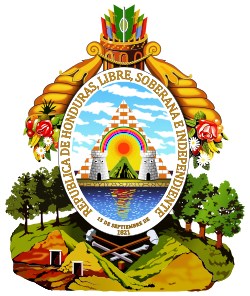2008-2009 Supreme Court election crisis
Following months of political wrangling that dominated news in Honduras, the National Congress selected 15 new judges to ascend to the Supreme Court of Justice shortly before midnight on January 25, 2009, as the previous court’s term was set to expire that same day. [9] The final issue was an attempt by the executive branch to re-elect a sitting member of the court who wasn’t on the slate of 45 candidates, Sonia Marlina Dubón de Flores. [9]
The standoff included alleged threats from Defense Minister Arístides Mejía to surround the congressional building with tanks should members fail to comply with the request to reseat Dubón. [9] An angry retort from President of the National Congress Roberto Micheletti, who said that the legislature abided by democracy and rule of law, not military threats or pressure. [9] Mejía later denied making such threats. [9]
President Manuel Zelaya appeared before Congress shortly after the standoff to quell rumors started by National Party opponents that he was attempting a coup over the issue. [9] Finally, the two majority parties in Congress decided to split the court between eight Liberal Party and seven National Party candidates — a switch from the previous court, in which the National Party held a one-member majority. [9]
The Democratic Unification (or Unified Democracy) and Innovation and Unity parties abstained from the final vote in protest of the system used to select the court. Instead of voting on a block of candidates pre-selected by the two majority parties, they would have preferred to vote on each candidate individually. Unified Democracy Congresswoman Doris Gutiérrez lamented the low numbers of women, saying, “We now have a scant 20 percent of women on the court, where we’ve always had seven or eight [of 15].” Human Rights Commissioner Ramon Custodio and several evangelical leaders said the new court would be less partisan and politicized than it had been in the past, despite Congress' final selection method. U.S. Ambassador Hugo Llorens called the selection "a great step forward for democracy, the judiciary and transparency in Honduras." [10]
The fifteen members of the Supreme Court are appointed by agreement between the two main political parties for a seven year term. An organization claims that the highest judicial offices still being distributed between the two main parties. [11] By requiring them to be re-elected by the National Congress it makes them subject to policies of their sponsoring party. [12] Eight of the judges were selected by the Liberal Party and seven by the National Party.
An international mission in 2008, organized by the International Commission of Jurists and the Due Process of Law Foundation, admired the inclusive nature of the selection process, but received information from multiple sources about alleged irregularities in the elaboration of certain lists, and information concerning alleged political influence, which might serve to undermine the selection process. [9] The Mission verified widespread distrust in the selection process, more specifically, a belief that the candidate lists are a result of political and powerful interest groups interferences. [9] The Mission recognized the interest expressed by, and opening up of, many key actors and groups within the Honduran society towards the selection process and invited the international community to become more involved and to promote a transparent process that leads to the selection of justices with the stature required by a Supreme Court. [9]
2009 Honduran constitutional crisis
On 27 May 2009, the Administrative Law Tribunal issued an injunction against holding the poll at the request of the Honduran Attorney General Luis Alberto Rubi. On 16 June the Court of Appeals unanimously upheld the 27 May injunction. On 18 June, the Administrative Law Tribunal ordered Zelaya to comply with the ruling in writing within five days. On 26 June, the Supreme Court unanimously found that the Presidency had not complied with the 18 June court order and issued a sealed order to detain President Manuel Zelaya for the purposes of taking a statement. [13] [15] [16] This precipitated some of the most dramatic events of the 2009 Honduran constitutional crisis.
The court was criticized by several UN experts for the dismissal of several judges in relation to the crisis. [17] They noted the dismissals appeared related only to the public expression of opposition to events during the crisis and that the accused judges were not given the opportunity to participate in the proceedings.

